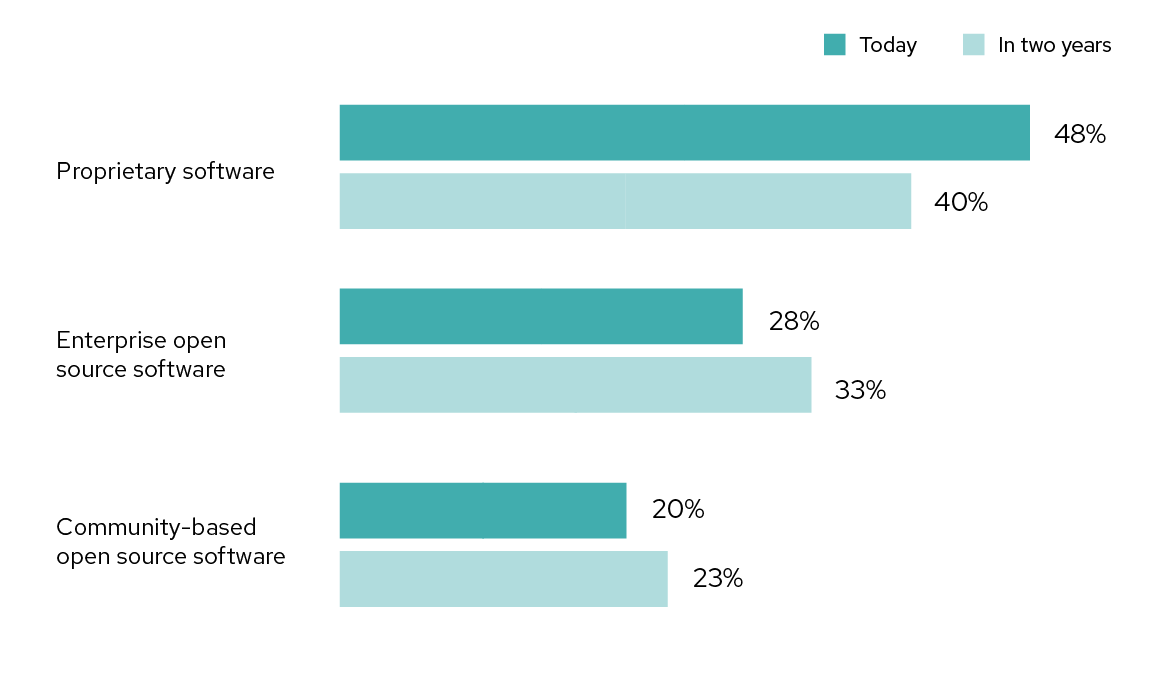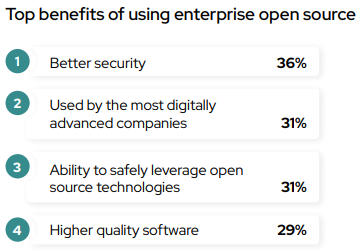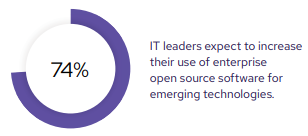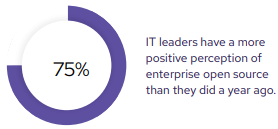Red Hat’s fourth annual The State of Enterprise Open Source report highlights how organizations have adapted to new ways of operating — whether due to external forces or proactive choices — and are selecting methods that provide better competitive advantage.
The report is based on interviews of 1,296 IT leaders from 14 countries, presenting an unbiased view of the use of enterprise open source. Respondents stated they have influence over the purchasing decisions within their organization (in app development, app infrastructure, cloud, storage, middleware, server OS, or virtualization), and were not informed that Red Hat was the sponsor of the survey. Respondents also needed to be familiar with enterprise open source, and have at least 1% Linux installed at their organizations.
Results suggest that developments originating from open source communities were — and remain — well-prepared to accommodate the need for agile solutions at present and in the future.
Since technology decisions impact organizational responsiveness and innovation, the flexibility and selection of enterprise open source is no longer an “if”, but a “when and how” — applicable for both legacy and yet to be realized configurations. This is reinforced by the finding that 95% of respondents say that enterprise open source is important to their organization’s overall enterprise infrastructure.
Highlights from the report within the financial services industry
An examination of the highly competitive financial services industry — with 156 financial services IT leaders participating by responding to the survey — provided especially insightful findings regarding the role of open source implementations. Shifting competition, the paramount need for security, and the ability to support legacy systems while remaining forward-looking are just a few of the continuing challenges of the sector.
When queried about the top uses of enterprise open source, financial services IT leaders cited the following top four reasons, with digital transformation efforts leading the way at 54%. Rather than solely replacing proprietary software and replacing it with open source implementations, newer usage categories are also present, including application integration and development, each at 49%.

As a direct reaction to the immediate challenges associated with an altered operational environment during the pandemic, 86% of IT leaders in the financial services industry overwhelmingly endorsed enterprise open source solutions at a time when flexibility and innovation was needed most.

Many surveyed identified distinct advantages of using enterprise open source software and tooling, including its flexibility (69%), access to latest technology (74%) and simplification in adopting a hybrid cloud infrastructure (75%).

Other findings from financial services
In addition to the top-line findings, we identified a few more trends that are worth exploring from the perspective of financial services.
A. Enterprise open source continues to gain momentum at the expense of proprietary software
Proprietary software as a percentage of the software already in use in respondents’ organizations continues to show a marked decline, with a further expected drop of eight points over the next two years.
Migration in usage is increasingly shown to be happening within the enterprise open source category, demonstrating a climb of five points, with community-based open source also increasing three points over the same period.

B. Security is a trusted benefit of enterprise open source
The financial services industry is one in which security is of utmost concern to satisfy both regulatory and customer trust criteria, and there is no shortage of attention and resources dedicated to this area .
At one time, the security misperception of open source software implementation was viewed as a potential liability, but at present, 84% of IT leaders in financial services believe enterprise open source is as secure or more secure than proprietary software.
In response to the query of “What are the top benefits of using enterprise open source?”, “Better security” was indicated as the top ranking answer (36%).

Driving the confidence behind these responses among the survey participants is how enterprise open source software is created and delivered in general. Organizations prefer using well-tested enterprise open source code, especially where security updates are well documented, made available promptly, and receive broader examination than would be available with proprietary code.
C. Financial services IT leaders expect to increase their use of enterprise open source software for emerging technologies
It comes as no surprise that in a hyper-competitive financial services sector the increased use of enterprise open source extends to important emerging technology workloads, with 74% of respondents planning to increase their use of enterprise open source in areas such as artificial intelligence (AI), machine learning (ML), edge computing and the Internet of Things (IoT).
The mindset associated with enterprise open source has trended in an ever more favorable light. Also impressive is that 75% of financial services IT leaders indicated they have a more positive perception of enterprise open source than just a year ago.


Organizations that responded are utilizing enterprise open source solutions and technologies in a large number of relatively new software categories, including containers, Kubernetes for container orchestration, and the vast number of complementary cloud-native open source projects. Enterprise open source continues to grow, and is showing no signs of slowing down.
Explore further
Intrigued enough to gain even more insights on enterprise open source in the financial industry? You can find them in The State of Enterprise Open Source: Financial Services Infographic, or we invite you to explore the full The State of Enterprise Open Source report.
Interested in how Red Hat enables open source solutions in the financial services sector? Much more information is available here.
Sobre el autor
John has extensive experience guiding organizations to success via innovative architecture of products, digital strategy, and customer and user experiences - particularly in online and mobile marketing, e-commerce, product management, web analytics and interactive content development.
Navegar por canal
Automatización
Conozca lo último en la plataforma de automatización que abarca tecnología, equipos y entornos
Inteligencia artificial
Descubra las actualizaciones en las plataformas que permiten a los clientes ejecutar cargas de trabajo de inteligecia artificial en cualquier lugar
Servicios de nube
Conozca más sobre nuestra cartera de servicios gestionados en la nube
Seguridad
Vea las últimas novedades sobre cómo reducimos los riesgos en entornos y tecnologías
Edge computing
Conozca las actualizaciones en las plataformas que simplifican las operaciones en el edge
Infraestructura
Vea las últimas novedades sobre la plataforma Linux empresarial líder en el mundo
Aplicaciones
Conozca nuestras soluciones para abordar los desafíos más complejos de las aplicaciones
Programas originales
Vea historias divertidas de creadores y líderes en tecnología empresarial
Productos
- Red Hat Enterprise Linux
- Red Hat OpenShift
- Red Hat Ansible Automation Platform
- Servicios de nube
- Ver todos los productos
Herramientas
- Training y Certificación
- Mi cuenta
- Recursos para desarrolladores
- Soporte al cliente
- Calculador de valor Red Hat
- Red Hat Ecosystem Catalog
- Busque un partner
Realice pruebas, compras y ventas
Comunicarse
- Comuníquese con la oficina de ventas
- Comuníquese con el servicio al cliente
- Comuníquese con Red Hat Training
- Redes sociales
Acerca de Red Hat
Somos el proveedor líder a nivel mundial de soluciones empresariales de código abierto, incluyendo Linux, cloud, contenedores y Kubernetes. Ofrecemos soluciones reforzadas, las cuales permiten que las empresas trabajen en distintas plataformas y entornos con facilidad, desde el centro de datos principal hasta el extremo de la red.
Seleccionar idioma
Red Hat legal and privacy links
- Acerca de Red Hat
- Oportunidades de empleo
- Eventos
- Sedes
- Póngase en contacto con Red Hat
- Blog de Red Hat
- Diversidad, igualdad e inclusión
- Cool Stuff Store
- Red Hat Summit

